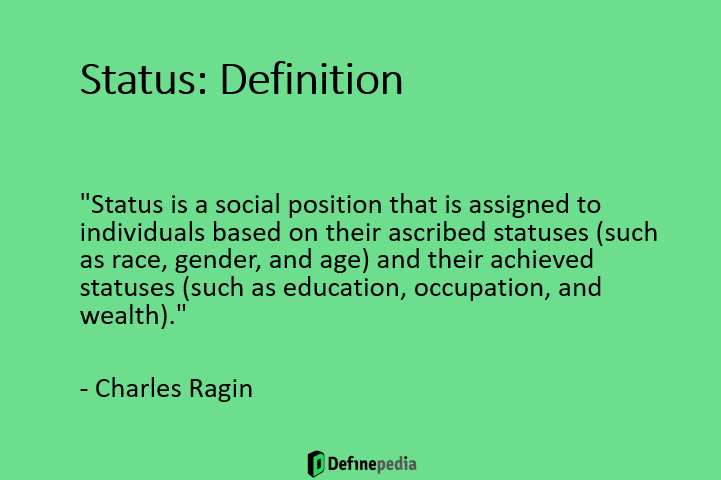What is Status?
Status, a fundamental concept in sociology, holds significant importance in understanding the dynamics of human societies.
It influences interactions, roles, and relationships within a given community. Status encompasses a person’s societal rank, often determining their privileges, responsibilities, and opportunities.
Status refers to the position an individual holds within a social hierarchy. This hierarchy determines the individual’s relative prestige, influence, and access to resources in society.
Status can be based on a variety of factors, including wealth, power, education, occupation, race, gender, and age.
Definition of Status

“Status is a position that a person occupies within a social group or society.” David Myers
“Status is a social ranking that reflects a person’s position in society.” James M. Henslin
“Status is a position in a social hierarchy that is assigned to individuals based on factors such as wealth, power, education, occupation, and age.” David B. Grusky
“Status is a social position that is defined by the rights, privileges, and obligations that are associated with it.” Randall Collins
“Status is a social position that is assigned to individuals based on their ascribed statuses (such as race, gender, and age) and their achieved statuses (such as education, occupation, and wealth).” Charles Ragin
Status, in sociological terms, refer to one’s stand within a society. It can be high or low, influencing how a person’s perceived.
People holds various status’ such as parent, teacher, doctor, and more. These status’ come with role that individual must fulfil. The term status can also applies to position a person occupies in a particular group.
Features of Status
Status has certain feature’s that defines it. Status represent social hierarchy and often tied with person’s occupation or family background.
Secondly, it’s fluid and can changes over time due to achievement or life events.
Thirdly, status caries expectation’s which individuals should meet based on their societal position.
Types of Status
Status can be categorize into multiple type’s. These including ascribed status and achieved status. Each type has it’s own unique characteristics and impact on person’s life.
Ascribed vs Achieved Status
Ascribed status is assigned to individual without their control. It’s usually determine by factors such as age, race, gender, and family background.
Achieved status on other hand, is attained through person’s action’s and effort’s. This could be like becoming a lawyer, doctor, or accountant. The distiction between these two status’ is importan as it can influence person’s life choices and opportunities.
Each status comes with a set of role expectations. These are behaviors and responsibilities that society associates with a particular status. For instance, a teacher is expected to educate and guide students.
Status symbols are possessions, behaviors, or attributes that indicate a person’s social position.
These symbols can vary widely across cultures and may include clothing, jewelry, manner of speech, or even body language.
A master status is the most important status an individual occupies and often overshadows other statuses they hold.
For example, if someone is a famous actor, that status might become their master status, influencing how others perceive them.
Impact of Status
Status play a crucial role in society. It affect how individual interact with one another and what roles they take on.
For example, person with high status might have more say in decision making. This can lead to inequality and conflict if not manage properly.
Conclusion
In conclusion, status is complex and multifaceted concept that shape’s human interaction’s and relationship’s. It’s important to understand the different types of status and their implication’s on individual’s life.
Ascribed and achieved status’ highlight the dichotomy between factors beyond one’s control and those within their power to change.
By grasping the nuances of status, we can work towards a more egalitarian society, where each individual’s contribution is value, regardless of their societal stand.
Was this helpful?
0 / 0